

A propos - le site du Techno Pédagogue. Propriété intellectuelle. Géopolitique et mondialisation - Mélanie Dulong de Rosnay et Hervé Le Crosnier, Paris, CNRS Éditions, 2013. Propriété intellectuelle.
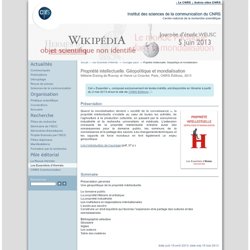
Géopolitique et mondialisation Mélanie Dulong de Rosnay et Hervé Le Crosnier, Paris, CNRS Éditions, 2013. Développement de collaborations et de partenariats. Plan TIC institutionnel du Cégep de La Pocatière by Martin Berube on Prezi. Pour penser à tout quand il s’agit d’utiliser les médias sociaux. Pour réussir son intégration des TIC.
CoP - Sciences de la nature - Accueil. Collection:digitaltippingpoint AND subject:"Children And Open Source" Disrupting Ourselves: The Problem of Learning in Higher Education (EDUCAUSE Review. Randy Bass (bassr@georgetown.edu) is Associate Provost and Executive Director of the Center for New Designs in Learning and Scholarship at Georgetown University.
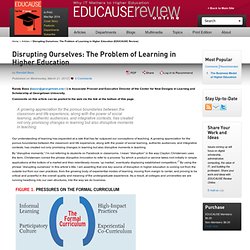
Comments on this article can be posted to the web via the link at the bottom of this page. A growing appreciation for the porous boundaries between the classroom and life experience, along with the power of social learning, authentic audiences, and integrative contexts, has created not only promising changes in learning but also disruptive moments in teaching. Our understanding of learning has expanded at a rate that has far outpaced our conceptions of teaching. A growing appreciation for the porous boundaries between the classroom and life experience, along with the power of social learning, authentic audiences, and integrative contexts, has created not only promising changes in learning but also disruptive moments in teaching. By “disruptive moments,” I’m not referring to students on Facebook in classrooms. The Post-Course Era. Learning, Teaching, and Scholarship in a Digital Age. Web 2.0 and Classroom Research: What Path Should We Take Now?
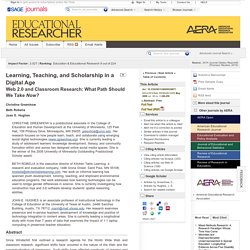
Abstract Since Windschitl first outlined a research agenda for the World Wide Web and classroom research, significant shifts have occurred in the nature of the Web and the conceptualization of classrooms. Such shifts have affected constructs of learning and instruction, and paths for future research. This article discusses the characteristics of Web 2.0 that differentiate it from the Web of the 1990s, describes the contextual conditions in which students use the Web today, and examines how Web 2.0’s unique capabilities and youth’s proclivities in using it influence learning and teaching.
Open Access to Social Sciences and Humanities Research: What Do Knowledge Users Need and What Do They Want? Open access to knowledge produced by publicly-funded university institutions is an ideal against which one cannot argue.
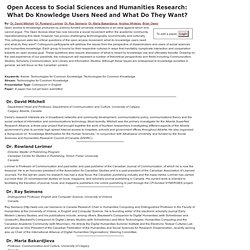
The Open Access ideal has now become a social movement within the academic community. Operationalizing this ideal, however, has proven challenging technologically, economically and culturally. La « flipped taxonomie » ou l’inversion de la taxonomie des compétences. Nous avons, dans la vidéo précédente, parler de la cohérence des objectifs, des méthodes, de l’évaluation … des outils.
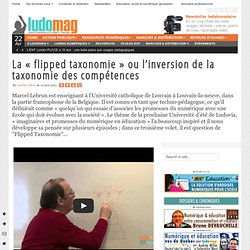
Les objectifs sont souvent décrits par un verbe (un savoir-faire, un savoir-agir, un savoir-être …) qui s’applique sur un nominatif (un contenu, un savoir, un savoir-faire …) : l’étudiant sera capable de « Verbe » à propos d’un « nominatif », par exemple, l’étudiant capable de citer les composantes de l’alignement constructiviste (épisode 2), l’étudiant sera capable d’appliquer la loi de Newton … Le « sera capable » associé au « verbe » est désigné par la notion de capacité. Cette capacité constitue encore un état potentiel … il sera capable, oui mais quand ? Comment ? Dans quel contexte ? Nouvelles. OKFN Canada - Groupe local de l'Open Knowledge Foundation – Local Group : promouvoir le savoir libre. Le groupe local de l’Open Knowledge Foundation Network au Canada est un groupe autogéré voué à la promotion du savoir libre.
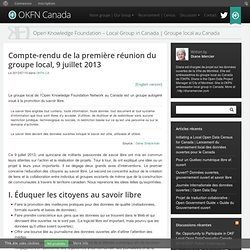
Ce 9 juillet 2013, une quinzaine de militants passionnés de savoir libre ont mis en commun leurs attentes sur l’action et la réalisation de projets. Tour à tour, ils ont expliqué une idée ou un projet à leurs yeux importants. Il se dégage deux grands axes d’interventions. Communauté d'apprentissage. Into the wild – Technology for open educational resources. Reflections on three years of the UK OER Programmes.
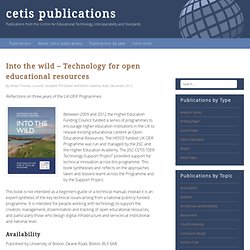
Between 2009 and 2012 the Higher Education Funding Council funded a series of programmes to encourage higher education institutions in the UK to release existing educational content as Open Educational Resources. The HEFCE funded UK OER Programme was run and managed by the JISC and the Higher Education Academy. The JISC CETIS “OER Technology Support Project” provided support for technical innovation across this programme.
This book synthesises and reflects on the approaches taken and lessons learnt across the Programme and by the Support Project. This book is not intended as a beginners guide or a technical manual, instead it is an expert synthesis of the key technical issues arising from a national publicly-funded programme. Availability Published by University of Bolton, Deane Road, Bolton, BL3 5AB. La communauté de pratique Son mode de vie de la r... Les nouvelles du Réseau REPTIC - REPTIC.qc.ca. Reflective Practice and Professional Development: Peter Tarrant: 9781446249512. About This Title The connections between reflective practice and professional development are the focus for this book, which offers guidance to support lasting change and provides strategies to enable self-initiated professional development.
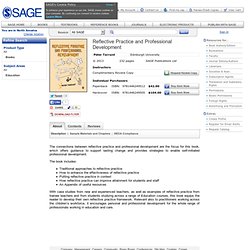
The book includes: Traditional approaches to reflective practiceHow to enhance the effectiveness of reflective practicePutting reflective practice in contextHow reflective practice can improve attainment for students and staffAn Appendix of useful resources With case studies from new and experienced teachers, as well as examples of reflective practice from trainee teachers and from students studying across a range of Education courses, this book equips the reader to develop their own reflective practice framework. Relevant also to practitioners working across the children’s workforce, it encourages personal and professional development for the whole range of professionals working in education and care. We hope you'll consider this SAGE text.